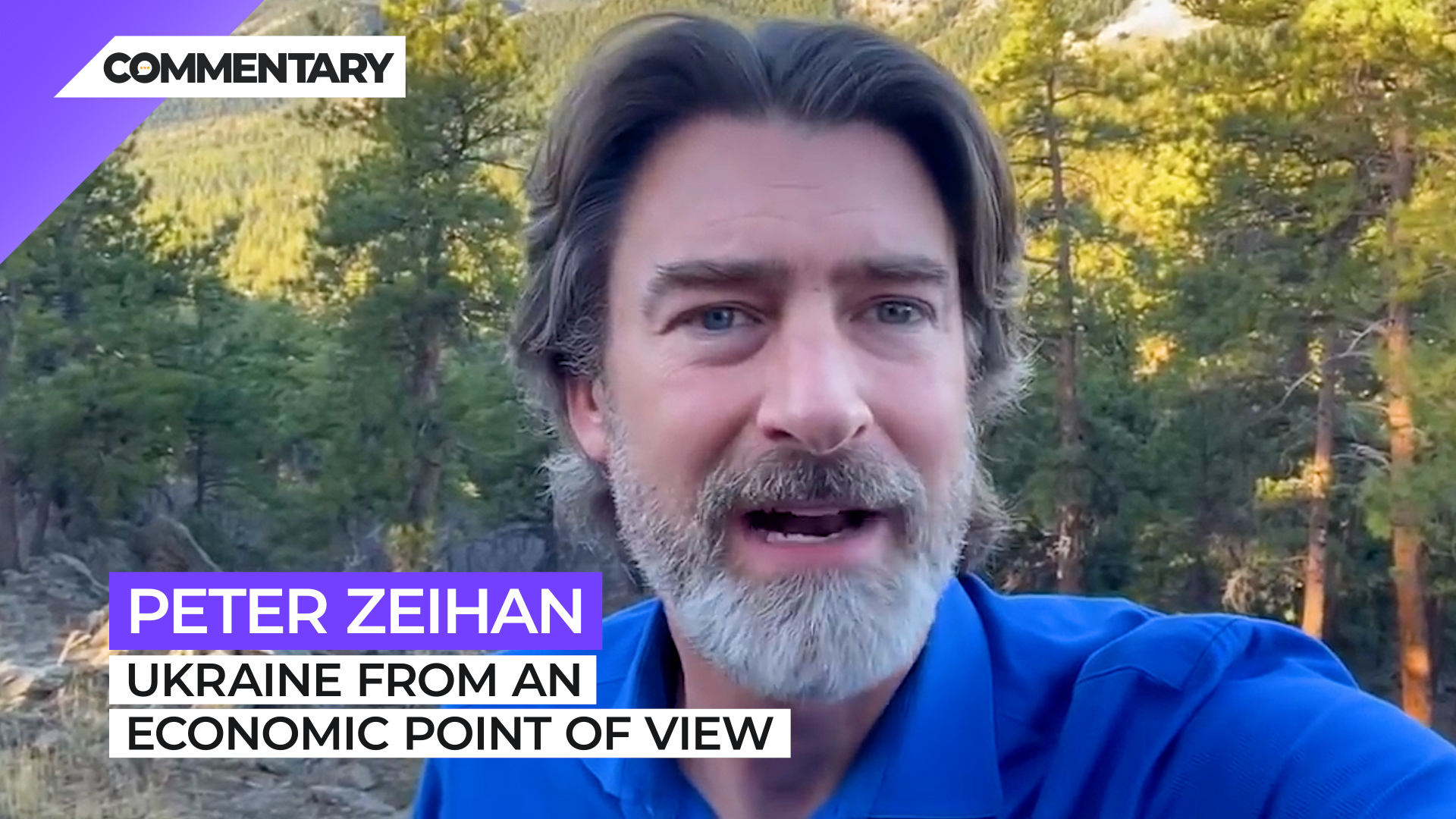
Commentary
-
Our commentary partners will help you reach your own conclusions on complex topics.
Hey everyone. Hello from Colorado where it is spring. It’s gonna be 75 degrees today. And then in three days we’re gonna get two inches of snow because mountains.
Today, I wanted to talk about Ukraine from an economic point of view. Now all the strategic issue that has been in most of my updates stands.
The Russians still need to plug those geographic gateways that allow access to their territory. So they still need to get all of Ukraine and then continue on. And the Russian population is still dying out, and this is their last chance to do so. All of that’s true, all of that stands, but there’s an economic issue underlying it that is worth exploring because it means that the Russians are going to be a little bit more brutal than they would otherwise need to be.
Ukraine in many ways is like the American Midwest. It has a big river going through its most productive territory. So in the United States, that’s the Mississippi, allows for all of the grain and soy producing states to export their stuff at low cost out to New Orleans. In Ukraine, it’s the Dnieper, serves the same purpose. Everything goes down the river and is ultimately repackaged at Odessa for shipment to the wider world. That means that from an American economic point of view, Ukraine make sense.
For Russia though, it doesn’t work that way. Russia only has one river that flows south. That is the Volga and it dead ends in the Caspian Sea, which is a landlocked lake. The north flowing rivers, the Ob for example, have a different problem.
One, they flow to the Arctic and no one lives there. So any sort of shipment has very roundabout. Two, in winter, the rivers flow from the mouth to the source rather than the other way around. And when your river is flowing into ice, it breaks up the ice. It pushes the ice ahead of it until there’s too much ice. And then the ice gets, by it’s mere weight, gets pushed down to the river bed and it forms an ice dam. Ice dams can last a long time and you get massive floods as the river overflows its banks. And it does this in Russia, every fall, moving into winter, all winter along, and then especially in the spring melt, cuz then it melts from the source to the mouth instead of the other way around.
And the water has nowhere to. So most of the flood Plains in most of the world are used for agriculture. In Russia, not necessarily because it’s a death trap. There’s actually a bit of a competition among the folks in the Russian military about who gets to go out and use 500 pound bombs on the ice dams to try to free up the rivers.
Now what this means in terms of the Russian empire, and you do need to think of Russia as an empire. It expands, it expands, expands until it hits those gateways, and all the countries that it expands through are occupied peoples. That’s, that’s an empire. That’s not a Republic. That’s not a democracy. It means that Russia knows that its internal distribution is crap, and Russia knows it can’t sell any excess production to the wider world, cuz it’s hard to get it out.
But Ukraine can, Ukraine is the most productive land in the Russian sphere of influence. They have huge agricultural surpluses, a fair number of metals, some coal, other chemicals. And it can all get out easily. And once it’s to the Black Sea, it can go to Turkey or through the Turkish Straits to Europe and the wider world.
For Russia, it’s never been that easy. So Ukraine has always been a territory that the Russians have grabbed onto very tightly. And now that Ukraine is making a reasonable go at being independent and even doing well in the war, the Russians feel they have to destroy all of that.
So the civilian infrastructure obliteration strategy that the Russians started about six weeks ago, it is, is continuing. We know that what happened in Bucha with the atrocities there have been replicated in at least 70 places in other places that the Russians occupy.
They’re in the process of doing that in Mariupol right now, the infrastructure is going to go because if the infrastructure goes then a modern industrialized society can’t exist. And ultimately that is like a secondary goal for the Russians compared to the security stuff. But it’s very, very much front of mind. Okay. The that’s everything for me until next time.
-
Hurricane Helene hits US coast, Appalachia and beyond
Hurricane Helene hit Florida and Georgia overnight between Sept. 26 and 27 as a Category 4 hurricane, and accompanying storms will continue reaching deeper into the continental United States today. Dangerous flash flooding from the hurricane, known as storm surge, was some of the worst flooding that the Tampa Bay area has ever seen, and… -
Israel holds upper hand against Lebanon, Hezbollah and Iran
On Wednesday, Sept. 25, Hezbollah launched a ballistic missile at Tel Aviv in retaliation for Israel’s explosive pager attack that blew up devices across Lebanon. Although Israel’s defense systems intercepted the surface-to-surface missile, the attempted strike on Tel Aviv marked a significant escalation by Hezbollah. Since the siege on Gaza began, shortly after the Oct. 7, 2023,… -
The Sinaloa Cartel civil war
Fears of a civil war within the Sinaloa Cartel are growing as violence between competing factions within the cartel continues. The Mexican Army has dispatched around 600 elite troops to Sinaloa to help quell those fears, in addition to roughly 2,200 regular soldiers and National Guard. Watch the above video as Straight Arrow News contributor… -
New Ukrainian weapons hit Russia where it hurts
Ukrainian drones struck a major Russian ammunition depot, triggering a massive explosion that was captured on camera. According to the Ukrainian military, 2,000 tons of munitions had arrived at the depot before the attack. Over the past two years, Ukraine has significantly increased its domestic drone production, allowing it to scale up attacks on military… -
Weighing social costs vs. economic benefits on immigration
Global human migration is one of the defining elements of our current historical era, according to the United Nations. Migrants face both the incentives to leave — forced out by climate change, crime and corruption, extreme poverty or violence — and incentives for where to go, based on available job opportunities and so on. Migration…
Latest Stories
-
 Reuters
Reuters
LeBron James first to reach 50k points, shows no signs of slowing down
-
 Getty Images
Getty Images
Trump admin seeking to sell nearly 450 vacant, underused federal spaces
-
 Getty Images
Getty Images
US stops intelligence aid to Ukraine amid overnight Russian attacks
-
 Getty Images
Getty Images
Gene Hackman’s dead dog misidentified as details continue unfolding
-
 Getty Images
Getty Images
Sexual violence used as war tactic against Sudanese children: UNICEF
Popular Opinions
-
In addition to the facts, we believe it’s vital to hear perspectives from all sides of the political spectrum.
Latest Opinions
In addition to the facts, we believe it’s vital to hear perspectives from all sides of the political spectrum. We hope these different voices will help you reach your own conclusions.
The opinions published in this section are solely those of the contributors and do not reflect the views of Straight Arrow News.





















Latest Commentary
We know it is important to hear from a diverse range of observers on the complex topics we face and believe our commentary partners will help you reach your own conclusions.
The commentaries published in this section are solely those of the contributors and do not reflect the views of Straight Arrow News.
Dr. Frank Luntz
Pollster and Political Analyst‘Biased’: What Americans think of ‘mainstream media’
‘Getting rid of them’: Americans discuss Trump and immigration
‘Woke’: Why some Biden 2020 voters backed Trump in 2024